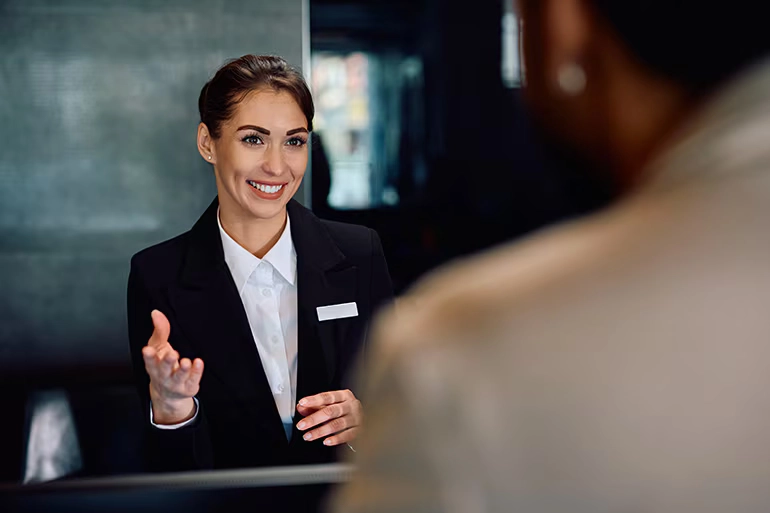
Training for a hotel Property Management Systems (PMS, POS, Chennel manager etc) is essential for ensuring that staff can use the system efficiently and confidently, leading to smoother operations and improved guest experiences. We deliver proper and effective PMS training for hotel staff, tailored to meet the needs of different roles. We are following methods when delivering the traing to our hotel clients.
1. Training Needs Assessment
• Identify Role-Specific Requirements: Each department (front desk, housekeeping, reservations, management, F&B Staff) has unique PMS functions. Customizing training by role helps focus on relevant features and workflows.
• Evaluate Staff Skill Levels: Assess staff familiarity with technology and any previous experience with similar systems to determine the level and pace of training needed.
2. Create a Training Plan and Schedule
• Training Phases: Divide the training into manageable phases, starting with basic functionalities and progressing to advanced features. Begin with core modules and move to more specialized tasks.
• Training Timeline: Develop a training schedule that minimizes disruption to hotel operations. This may include conducting training sessions during off-peak hours or in staggered shifts.
• Blend Training Approaches: Combine hands-on training, live demonstrations, and self-paced learning resources to accommodate different learning styles.
3. Role-Specific Training Modules
• Front Desk Training:
• Reservations and Check-Ins/Check-Outs: Teach front-desk staff to create, modify, and cancel reservations, handle group bookings, and manage guest check-ins and check-outs.
• Billing, Payments and Fiscalization: Cover guest billing, folio management, and processing payments or refunds to ensure smooth financial transactions.
• Guest Preferences and Profiles: Demonstrate how to update guest profiles, track preferences, and handle loyalty or rewards programs.
• Housekeeping Training:
• Room Status Management: Train housekeeping staff to update room statuses (clean, dirty, inspected) in real-time, coordinating with the front desk.
• Task Assignment and Scheduling: Show staff how to receive and manage cleaning and maintenance tasks, mark tasks as complete, and request support as needed.
• Reservations and Revenue Management Training:
• Rate Management: Teach the reservations team to adjust room rates, manage rate plans, and implement yield management strategies.
• Channel Management: If the PMS integrates with booking channels, cover how to manage availability and rates across OTAs and direct booking channels.
• Reporting and Analytics: Train staff on generating and interpreting reservation reports, occupancy forecasts, and revenue data to support decision-making.
• Management and Reporting Training:
• Operational Reports: Show managers how to access and interpret key operational reports (e.g., occupancy, revenue, and guest feedback).
• Custom Report Creation: Teach managers to customize reports to track KPIs, guest satisfaction, and staff performance.
• User Access and Permissions: Train on managing user roles and permissions, allowing managers to control system access based on staff roles.
4. Interactive and Hands-On Training
• Sandbox or Test Environment: Use a sandbox environment for training so staff can practice tasks without affecting live data. This is crucial for building confidence and reducing errors.
• Real-World Scenarios: Provide training scenarios (e.g., handling an overbooking, group reservations, early check-ins) to simulate common challenges.
• Role-Playing Exercises: Conduct role-playing sessions to help staff practice guest interactions using the PMS, such as booking modifications or billing inquiries.
5. Use Visual Aids and Documentation
• Training Videos and Tutorials: Provide video tutorials on common tasks, enabling staff to revisit key functions when needed.
• Step-by-Step Guides and Checklists: Create job aids like quick-reference guides, screenshots, and step-by-step instructions for daily tasks.
• Digital Knowledge Base: Set up a centralized repository with FAQs, troubleshooting guides, and tips for more in-depth learning.
6. Continuous Learning and Refreshers
• Ongoing Training Sessions: Schedule periodic refresher sessions or advanced training to keep staff up-to-date, especially after system updates or when adding new features.
• New Employee Training: Develop an onboarding training program for new hires, ensuring they’re comfortable with the PMS before starting live operations.
• Cross-Training: Train staff on secondary responsibilities within the PMS. For example, front-desk staff might learn basic housekeeping functions to improve flexibility during peak times.
7. Provide Self-Service and Support Resources
• Help Desk and Support Access: Ensure that staff know how to access PMS support or help desk services for quick resolution of issues.
• User Manuals and Online Documentation: Make the PMS manual and help resources accessible for self-paced learning or troubleshooting.
• Feedback Mechanisms: Encourage staff to provide feedback on the training and note areas where additional support or clarification is needed.
8. Measure Training Effectiveness
• Assess Proficiency Levels: Evaluate staff understanding through quizzes, practical tasks, or completion of specific workflows within the PMS.
• Monitor Performance Metrics: Track key metrics post-training, like check-in times, guest service ratings, and billing accuracy, to gauge training impact.
• Address Knowledge Gaps: Identify areas where staff may need further training and provide additional resources or sessions as needed.
9. Adapt Training for System Updates
• System Update Briefings: Provide update briefings when new features or changes are introduced in the PMS, helping staff quickly adapt to new workflows.
• Release Notes and Change Logs: Share detailed notes on updates and how they impact daily operations, enabling a smooth transition after system upgrades.
Benefits of Effective Hotel User Training
• Reduced Errors and Downtime: Well-trained staff can complete tasks more efficiently, reducing errors and downtime.
• Enhanced Guest Experience: Staff who understand the PMS can respond quickly to guest requests, leading to improved service quality and guest satisfaction.
• Higher Staff Confidence and Morale: Proficient users are more confident, engaged, and capable of handling issues, leading to a smoother, more cohesive operation.
Our experience is taht a well-structured PMS training program equips hotel staff with the skills needed to handle daily operations confidently, delivering superior guest experiences and maximizing the efficiency of the hotel’s operations.

Montora Software - Copyright 2025. All rights reserved.